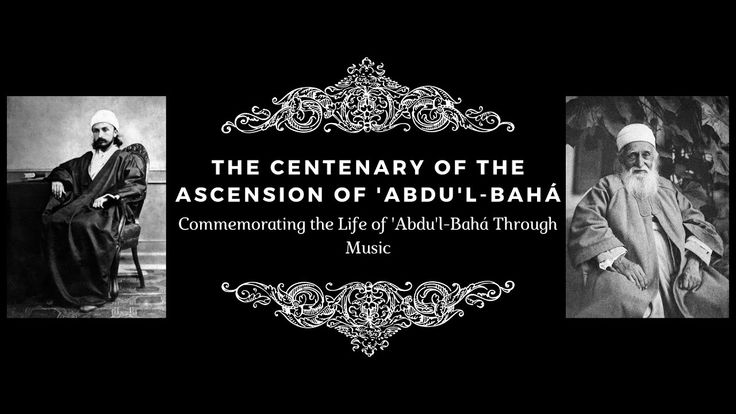In the annals of the Baha’i Faith, the Ascension of ‘Abdu’l-Bahá represents a pivotal moment, imbued with profound spiritual significance and exemplary lessons for followers. The teachings of ‘Abdu’l-Bahá serve as guiding principles that illuminate the path towards unity, understanding, and the promotion of peace. As we gather to celebrate His Ascension, a playful question emerges: How can one weave the essence of ‘Abdu’l-Bahá’s teachings into our collective consciousness and daily lives while honoring His legacy?
This inquiry compels us to delve into not only the historical context of ‘Abdu’l-Bahá’s life but also the pragmatic application of His ideals. By exploring the multifaceted layers of His teachings and the vibrant expressions of devotion, followers can engage in a rich tapestry of celebration that transcends mere remembrance. The following guidelines aim to elucidate the essence of this celebration, promoting an enriching dialogue within community contexts.
1. Understanding ‘Abdu’l-Bahá’s Role in the Baha’i Faith
To commence, it is essential to grasp the fundamental role that ‘Abdu’l-Bahá played as the appointed successor of Bahá’u’lláh. He was not only the embodiment of His Father’s teachings but also the architect of His vision, illustrating the principles of social transformation and moral upliftment. His life exemplified service, humility, and a profound commitment to promoting justice. Knowing this, we can appreciate the sheer magnitude of His contributions and the reasons for commemorating His Ascension.
2. The Significance of Ascension: A Spiritual Reflection
Ascension, in Baha’i theology, embodies the transition from the physical to the spiritual realm. It signifies a progression toward a heightened state of existence where the soul is liberated from worldly constraints. Observing ‘Abdu’l-Bahá’s Ascension invites introspection on the spiritual journey each believer undertakes. Reflecting upon His words and actions catalyzes personal growth, prompting individuals to examine their spiritual lives and the commitment to manifesting His teachings in actionable ways.
3. Commemorative Gatherings: A Collective Endeavor
The teachings of ‘Abdu’l-Bahá encourage communal engagement. Organizing gatherings that celebrate His life can foster a strong sense of unity among participants. These gatherings may involve discussions on His teachings, performances of His favorite music, or sharing artistic expressions inspired by His life. Such avenues not only honor ‘Abdu’l-Bahá’s memory but also strengthen communal bonds by creating shared experiences filled with reverence and joy.
4. Integrating Music and the Arts
Music, in particular, holds a special place in Baha’i celebrations. It serves as a conduit for emotional expression and spiritual connection. Incorporating hymns and compositions that resonate with the themes of love and unity can be transformative. By embracing artistic forms such as poetry, visual arts, and drama, believers can articulate their emotional responses to the teachings of ‘Abdu’l-Bahá. How might a community tableau or a musical rendition inspire deeper connectedness to the principles He espoused?
5. Service: The Practical Application of His Teachings
‘Abdu’l-Bahá’s life was characterized by His unparalleled commitment to service. Engaging in acts of service in honor of His Ascension can be a powerful tribute. Organizing community service initiatives not only reflects the essence of His teachings but also aligns with the Baha’i principles of unity and cooperation. How could one’s actions catalyze broader community transformations, fostering a sense of responsibility among individuals?
6. Reflection and Discussion: Nurturing the Spiritual Climate
Creating spaces conducive to reflection is paramount during this commemorative period. Hosting study circles centered around His writings offers participants the opportunity to engage in meaningful dialogues that illuminate His teachings. Reflective discussions can enhance understanding, leading to personal revelations and a deeper commitment to embodying His principles. What insights might emerge from such reflective engagements, and how could they shape future community endeavors?
7. Personal Commitment: Embracing Changed Perspectives
The commemoration of ‘Abdu’l-Bahá’s Ascension is not merely a ritual but an invitation to personal commitment. Adopting a mindset that seeks to embody His teachings necessitates an unwavering promise to pursue unity, justice, and compassion in daily interactions. Each individual is called to contribute to the creation of a more just and peaceful society, inspired by the exemplary life of ‘Abdu’l-Bahá. In what ways can this personal commitment not only enhance individual growth but also ripple through the wider community?
8. International Observance: Connecting Globally
Considering the global nature of the Baha’i community, it is beneficial to partake in international observances of ‘Abdu’l-Bahá’s Ascension. These communal expressions transcend geographical boundaries, allowing individuals to connect across cultures and languages. Engaging with global celebrations cultivates a sense of belonging and appreciation for the diverse ways followers honor His legacy. How might these international connections enrich local practices and expand horizons within the Baha’i community?
Conclusion: A Vibrant Legacy
Celebrating ‘Abdu’l-Bahá and honoring His Ascension can transcend mere observance; it can serve as a catalyst for transformation, unity, and joy. By immersing in the teachings and engaging creatively within the community, believers cultivate a deeper understanding of His legacy and its implications for individual and collective progress. Thus, as followers commemorate this significant event, they participate not only in remembrance but also in the living embodiment of ‘Abdu’l-Bahá’s vision for humanity. Can this celebration inspire a renewed commitment to the pioneering spirit embodied by ‘Abdu’l-Bahá, allowing His teachings to resonate in the hearts and actions of every believer?
